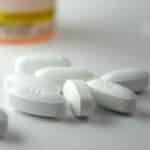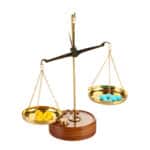Ritalin Vs. Dexedrine | Similarities & Differences
Ritalin and Dexedrine are very similar drugs. They work on similar disorders, have similar classifications, and have almost identical side effects.
But despite all the similarities the two drugs have, they are not the same medication. They do have differences, including the drugs they interact with and how long they stay in the body.
Similarities Between Ritalin & Dexedrine
Ritalin and Dexedrine have quite a few similarities. If you based it on their similarities alone, you might think they were the same drug.
Approved Medical Uses
Both Dexedrine and Ritalin treat attention-deficit hyperactivity disorder (ADHD) and narcolepsy. They work by increasing focus and decreasing impulsivity, inattention, and other ADHD symptoms.
Drug Schedule
The two ADHD medications also have the same control status by the Drug Enforcement Administration (DEA) and Food and Drug Administration (FDA).
They are both schedule II drugs which means they have a high potential for abuse and can lead to psychological and physical dependence.
Drug Class
Ritalin and Dexedrine are both central nervous system stimulant medications.
They work by activating the central nervous system (CNS) and increasing the amount of the neurotransmitters dopamine and norepinephrine in the brain. This increase helps treat the symptoms of ADHD and narcolepsy.
Adults, Adolescents, & Children
Both drugs are prescribed to adolescents and adults for the treatment of ADHD. They are also both used to treat narcolepsy in adults. The dosage might be different for kids versus adults, but the medication is the same.
Side Effects
Dexedrine and Ritalin also have many of the same side effects. Most of these side effects range from mild to moderate but they can occasionally become severe.
Some of the most common side effects of Dexedrine and Ritalin include:
- headache
- dry mouth
- weight loss
- loss of appetite
- increase in heart rate
- dizziness
- nausea
- vomiting
- diarrhea
- abdominal pain
- trouble sleeping
- sweating
- irritability
Both ADHD drugs can also lead to withdrawal symptoms when you stop use, including fatigue, intense drug cravings, and depression.
Pre-Existing Medical Conditions
The two stimulant medications also don’t work well with various health conditions. If you have any of the following health issues or history of these health issues, your healthcare provider may choose a different medication to put you on:
- high blood pressure
- blood circulation problems
- heart problems like heart attack, cardiomyopathy, or coronary artery disease
- family history of heart problems like heart attack or sudden death
- mental health disorders like bipolar disorder, depression, or anxiety
- family history of mental health disorders
- personal or family history of uncontrolled muscle movements/tics
- history of substance use disorder
Differences Between Ritalin & Dexedrine
Despite how many similarities these two prescription medications have, they also have a few differences. These differences are why the two medications aren’t interchangeable.
Ingredients
One of the main areas Dexedrine and Ritalin differ is what they are made of. Dexedrine is the brand name for dextroamphetamine while Ritalin is the brand name for methylphenidate.
Half-Life
Dexedrine and Ritalin also have very different half-lives. Dexedrine’s half-life is 34 hours. This means that it takes that long for half the dose to exit your system. Ritalin’s half-life is only 4 hours and will completely exit your system in about 8 hours.
These times aren’t exact though. It can depend on your body, the dose you’re taking, and whether it’s an immediate-release/short-acting or an extended-release/long-acting formulation.
Drug Interactions
There are also certain medications that Dexedrine and Ritalin should not be mixed with as they can lead to serious health issues. While some of the drugs you shouldn’t take with Dexedrine or Ritalin are similar, others are not.
Dexedrine shouldn’t be mixed with:
- monoamine oxidase inhibitors (MAOIs)
- some antidepressants
- over-the-counter cold and cough medicines
- medications containing amphetamine or lisdexamfetamine like Adderall/Adderall XR and Vyvanse
- antacids
- seizure medications
- antihistamines
- migraine medicine
- medication for heartburn and ulcers
- some supplements
Ritalin shouldn’t be mixed with:
- monoamine oxidase inhibitors (MAOIs)
- medications containing dexmethylphenidate like Focalin
- blood pressure medication/blood thinners
- certain antidepressants
- seizure medication
- medication for heartburn and ulcers
- some supplements
If you’re struggling with stimulant abuse or any form of substance abuse, please contact us today. Our treatment options include behavioral therapy, peer support groups, and intensive outpatient programs.
Sources
Written by
Northeast Addition Editorial Team
©2024 Northeast Addition Center | All Rights Reserved
This page does not provide medical advice.








